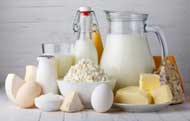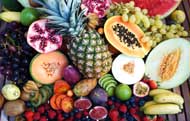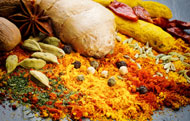




Medical Cuisine

For thousands of years humans have recognised the medicinal properties of certain foods.
Australia’s first people the aborigines were aware of the healing properties of certain foods and lineaments. Two very popular antiseptics Tea Tree and Eucalyptus Oil were part of aboriginal medicine.
|
Many Australian plants have super medicinal properties, for example;
|
|
Billy goat plum / Kakadu plum (Terminalia ferdinandiana) is the world’s richest source of vitamin C. The plum has 50 times the Vitamin C of oranges. Found in the woodlands of Northern Territory and Western Australia, this fruit was a major source of vitamin C for the native people in areas where it grows. |
|
The next people that came to Australia, the early explorers suffered many health problems from not getting the right food. Scurvy (lack of vitamin C) and night blindness (lack of vitamin A) were two very common diseases suffered amongst early explorers. Many convicts also died on voyages to Australia, poor diet and poor sanitation often being the cause of their demise. If only they had more garlic and onion to help their bodies fight infection.
|

|
Today our understanding of food has improved 100 fold, food science and technology are now using biochemistry (flow of chemical energy through metabolism) to better understand the nutritional and medicinal properties of food.
|
|
Food composition and chemistry is very complicated, and nearly all food is different in its structure, taste and chemistry. Some foods offer high energy (like potatoes) while other foods offer very little energy but provide high levels of essential nutrients like vitamin C (the immune system booster).
|
|
Food is very important because of nutrient value, health healing etc, but also because of its physical form. The size of food particles can affect the extent in which nutrients are digested and made ready for absorption. Fiber is also important, a necessary component to maintain a healthy digestive system.
|
|
Food has many components, with each component working on one or multitudes of bodily functions.
|
Fruit and vegetables, lean meats, good fat and oils, protein and carbohydrates, water and a good mental attitude are just some of the essential ingredients we need for optimal health.
Tasty foods, the right ingredients and last but not least, the six essential nutrients.
Vitamins are essential nutrients. Nutrients are the nutritional components in food that living organisms utilise to survive and grow.
Vitamins are essential for the healthy maintenance of cells, tissues, and organs. They enable us to use chemical energy that comes from food, and to help process the proteins, carbohydrates, and fats required for nutrition and ongoing life support.
Minerals are important for your body to stay healthy. Your body uses minerals for many different jobs, including building bones, making hormones and regulating your heartbeat.
|
Proteins are essential nutrients for the human body. They are one of the building blocks of body tissue.
|
|
Protein can be found in all cells of the body and is the major structural component of all cells in the body, especially muscle. When broken down into amino acids, they are used as precursors to nucleic acid, co-enzymes, hormones, immune response, cellular repair, and other molecules essential for life. Additionally, protein is needed to form blood cells.
|
|
What are protein foods
|
|
All foods made from meat, poultry, seafood, beans and peas, eggs, processed soy products, nuts, and seeds are considered part of the Protein Foods Group. Beans and peas are also part of the vegetable group.
|
|
Carbohydrate is an important source of energy for the body. Many carbohydrate-containing foods are high in dietary fibre and are healthy food choices. Carbohydrate is an important nutrient found in many foods.
|
|
What are Carbohydrate Foods
|
|
Carbohydrate containing foods include breads, breakfast cereal, rice, pasta, noodles, fruit, potato and starchy vegetables, corn, dried beans and lentils, sugar, milk and yoghurt.
|
|
Dietary fat is important for many body processes. Helps move some vitamins around the body and also helps with making hormones. There are different groups of dietary fat and each of the groups can have a different effect on your blood cholesterol level.
|
|
Fat Types
|
|
Dietary fat can be classified into four groups. These are saturated fats, monounsaturated fats, polyunsaturated fats and trans fats
|
|
All known life forms depend on water. Water is vital both as a solvent in which many of the body’s solutes dissolve and as an essential part of many metabolic processes within the body.
|
|
Protein Foods – USDA Center for Nutrition Policy & Promotion
|
|
Top 10 Aboriginal bush medicines – Australian Geographic
|
|
Protein – From Wikipedia, the free encyclopedia
|
|
Carbohydrates – The Dietitians Association of Australia (DAA) (Dietetic and nutrition professionals providing strategic leadership in food and nutrition )
|

